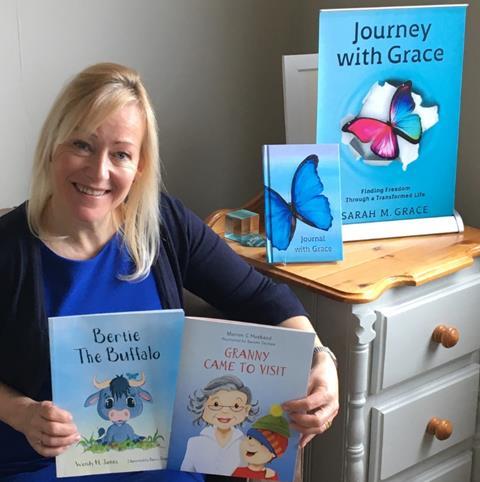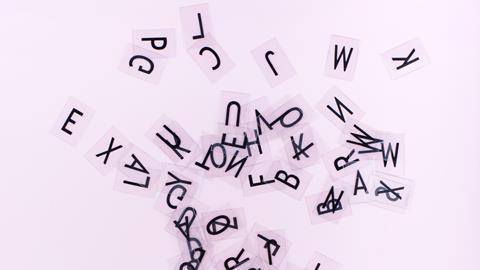Sarah Grace is a psychotherapist, publisher, author and creator of Sarah Grace Publishing, which pioneers accessible reading through being the first dyslexia-friendly Christian publisher in the UK
According to the British Dyslexia Association, ten per cent of the global population has dyslexia. “But I think it must be significantly higher than that,” says Sarah Grace, founder of dyslexia-friendly Sarah Grace Publishing. “Many individuals struggle for years without a diagnosis or an understanding of why they are the way they are. I was one of them.” Sarah was finishing her psychotherapy training when she discovered that she was dyslexic; a revelation that unlocked a new freedom in her relationship with and response to the written word.
Jumbled words
“Despite loving books, I have always found reading hard and didn’t do well in school,” Sarah shares. “I was born with eye problems, so I always assumed it was down to that.” Sarah taught herself to speed read, moving her eyes swiftly across a page before the words began to jumble, but she would often get to the end of a paragraph without the words really sinking in. “I would read a chapter and realise I couldn’t clearly recall what I’d read.” This all came to a head again when Sarah was studying for a counselling course at university. “Despite having a tight word count on assignments I’d often repeat myself, desperately trying to get my point across. I kept failing the assignments.” Sarah found a familiar anxiety escalating inside her when she was studying. She knew she was capable of the work, but found it disproportionately hard. “I got to a point when I felt like I couldn’t read at all. It was a really hard season in my life.”
Sarah encountered Jesus in 1997, when she found herself drowning under the demands of parenting two young children. With her marriage under strain and her heart tender, she asked her hairdresser about a parenting course she had mentioned eight years prior. “How I randomly remembered this conversation we’d had such a long time ago, God only knew!” It turned out to be a Christian outreach, and a marriage course rather than a parenting course, “which was exactly what I needed,” she confesses, “and I thought: ‘There must be a God who knows what I need.’” Sarah was gently loved into the church, eventually attending their Alpha course and discovering that there was a God who intimately knew her and cared for her.
“There was one day when, miraculously, my children napped at the same time, and I read the Why Jesus booklet I was given.” At the end of the booklet, Sarah felt moved to read the prayer of commitment, “and in that moment everything changed,” she shares. “My life flashed before me – like an old black and while film – and then Jesus was standing before me in my lounge, like he had always been there, waiting for me. I sobbed and continued crying for days.”

Making sense of everything
Sarah’s world brightened after this encounter. “It literally felt as though I could see more clearly. And after my husband became a Christian three months later, we threw ourselves into ministry.” It was this involvement in pastoral ministry that prompted Sarah to enrol in the counselling course. But as the course became increasingly challenging – with Sarah finding she couldn’t even read the Bible with any clarity anymore – she knew it was time to get help. “I assumed it was another problem with my eyes so went to my optician.” But much to her surprise, Sarah was told that on this occasion it wasn’t a problem with her eyes and was offered another explanation: “I think you might be dyslexic.”
Sarah approached her university who agreed to test her, leading to a diagnosis. “The test was a horrible, palm-sweating experience to sit through, but receiving a diagnosis was so liberating. Suddenly everything made sense.” Dyslexia is most commonly understood to be a learning difficulty that effects reading and writing, but the British Dyslexia Association explains that it also affects information processing, which can make learning and retaining things hard. Understanding this, Sarah was able to extend grace to herself; finally having a framework for her struggles, she understood herself better and why she found reading and the retention of knowledge difficult. “When we’re anxious, we don’t absorb what we’re reading,” she explains. “Knowing I was dyslexic took away my anxiety and slowed me down. I became more relaxed and more efficient.” Alongside practical aids, such as dyslexia-friendly programmes on her computer, the use of visual prompts and the simple act of slowing down and giving herself time, Sarah found her approach to reading change and her enjoyment of it begin to grow. “It was the beginning of a journey. I was able to complete my course and discover slower, more effective ways of reading, but I knew there was more to discover and [that there] must be new ways to open up the world of reading to dyslexics.”
Books made accessible
“As is the way with life sometimes, I ended up getting into publishing unexpectedly.” Despite struggling with words, Sarah also has a love for them. “I love noticing the pattern in words and letters. I have a creative mind (a common trait in dyslexics). I might find working with words harder than others, but that doesn’t mean I don’t love it.” So, it seemed a fitting coincidence when Sarah found herself supporting her friend Malcolm who was looking to publish a book written by an author who had locked-in syndrome (a rare disorder of the nervous system). “The initial editor’s report for the author led me to see he was dyslexic, as it sounded just like my university feedback. We started working together, and I offered to design a book cover; I could picture it in my mind. I wanted it to be clear and accessible to a dyslexic individual.” Sarah Grace Publishing grew slowly from that moment as an imprint of her friend’s publishing house, Malcolm Down Publishing. For the last few years Sarah Grace Publishing has become a beautiful amalgamation of significant parts of her life, as Sarah has sought to write and curate books that honour God and celebrate the dyslexic mind.
Her first children’s book, Bella Finds Grace, is a dyslexia-friendly picture book that helps children and young readers appreciate the unique gifts that dyslexia brings through a heartwarming story. “We’re born with the power to create and communicate, but we’re not born able to read. For some, it can be hard. I want to help empower dyslexic people to open books and be able to easily read and understand what’s on the page, and feel confident that dyslexia is a unique and beautiful gift.” For books published by Sarah Grace Publishing, this means clear spacing of letters and words, frequent paragraph breaks and sentences finishing on a page rather than rolling on to the next.
In 2018, another fortunate encounter led to Sarah having the opportunity to develop a dyslexia-friendly font, the Grace font, which is now endorsed by Cambridge University. This font is generously spaced, weighted at the bottom of the letter to assist the reader with following the line of words, and with similar letters uniquely designed making them easy to differentiate. “The response we’ve had to books printed in the Grace font has been overwhelming…In the last year I’ve connected with a women’s prison through an author I’m working with. Many of the women have read You, Me and the Butterfly [a novel set in a women’s prison] and have found it to be the first book they can fully access and follow, giving them confidence and encouragement as they easily read a story they can connect with.” The popularity of the Grace font has been growing over the last seven years as its impact in making literature accessible to a vast portion of the population has been appreciated. “This year we’ve had some exciting conversations with Spring Harvest who have recognised the value of the Grace front and are using our publishing services for their main theme book.”
Dyslexia-friendly Bibles
In January 2025, Sarah endorsed the first dyslexia-friendly Bibles using the English Standard Version and the Christian Standard Version translations. Printed in the Grace font, with a dyslexia-friendly layout and coloured overlays to reduce visual strain, dyslexic readers can now access adult and child versions of the Bible with ease and clarity. “The Bibles are flying off the shelves! It’s so freeing to know that people who once found reading the Bible challenging will be able to read and understand it with ease.” This is just the beginning of an exciting new movement in dyslexia-friendly Christian literature, as Sarah is working with a team to print their own Bible list later this year, including a New Testament and separate prints of individual gospels.































No comments yet